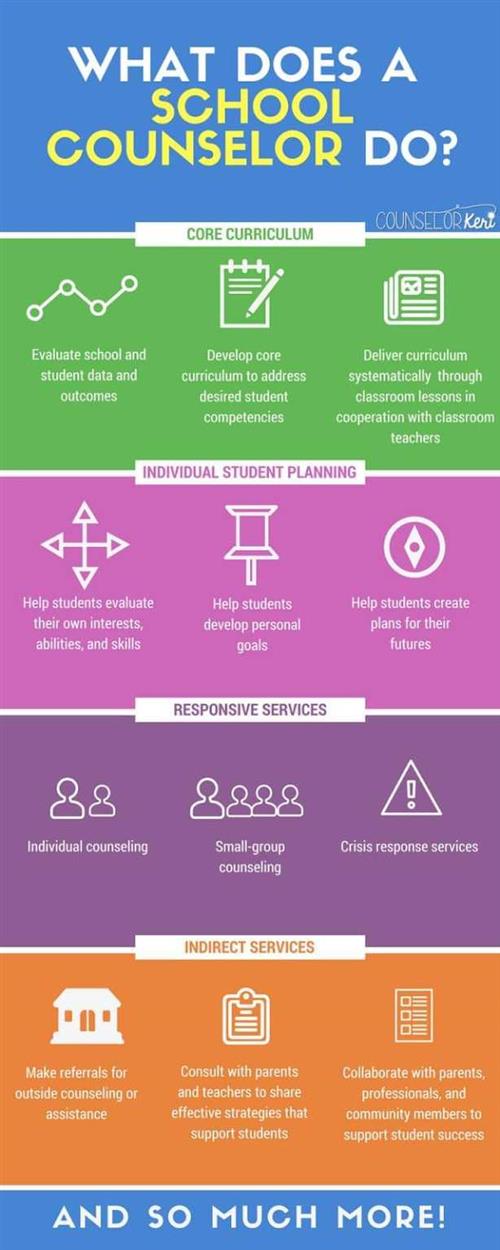-
About Elementary School Counseling
The elementary years are a time when students begin to develop their academic self-concept and their feelings of competence and confidence as learners. They are beginning to develop decision-making, communication and life skills, as well as character values. It is also a time when students develop and acquire attitudes toward school, self, peers, social groups and family. Comprehensive developmental school counseling programs provide education, prevention and intervention services, which are integrated into all aspects of children’s lives. Early identification and intervention of children’s academic and personal/social needs is essential in removing barriers to learning and in promoting academic achievement. The knowledge, attitudes and skills that students acquire in the areas of academic, career and personal/social development during these elementary years serve as the foundation for future success.
Source: American School Counselor Association, "Why Elementary Counselors?"How School Counselors HelpClassroom lessons address important preventative and developmental topics, including conflict resolution, bullying, academic skills, career, and personal safety, among others. Topics are determined by needs assessment data and teacher input and meet both state and national standards.
Small groups provide additional learning experiences, giving children the opportunity to build relationships, practice new skills, and learn through the support of group members. Small group topics vary widely and are determined by data and current need.
Individual counseling is offered on a short term basis for a variety of student concerns.
Consultation with parents and teachers is a critical part of the school counselor's role in advocating for students and helping them succeed.
School counselors help locate community resources for parents in search of information or services to help their child at home.
Select a School...
Select a School
- A.L. Lotts Elementary (es)
- Adrian Burnett Elementary School (es)
- Amherst Elementary School (es)
- Austin-East Magnet High School (hs)
- Ball Camp Elementary School (es)
- Bearden Elementary School (es)
- Bearden High School (hs)
- Bearden Middle School (ms)
- Beaumont Magnet Academy (es)
- Belle Morris Elementary School (es)
- Blue Grass Elementary School (es)
- Bonny Kate Elementary School (es)
- Brickey-McCloud Elementary School (es)
- Career Magnet Academy (hs)
- Carter Elementary School (es)
- Carter High School (hs)
- Carter Middle School (ms)
- Cedar Bluff Elementary School (es)
- Cedar Bluff Middle School (ms)
- Cedar Bluff Preschool (p)
- Central High School (hs)
- Chilhowee Intermediate School (es)
- Christenberry Elementary School (es)
- Copper Ridge Elementary School (es)
- Corryton Elementary School (es)
- Dogwood Elementary School (es)
- Dr. Paul L. Kelley Volunteer Academy (hs)
- East Knox County Elementary School (es)
- Fair Garden Family Center (p)
- Farragut High School (hs)
- Farragut Intermediate School (es)
- Farragut Middle School (ms)
- Farragut Primary School (es)
- Fort Sanders Ed. Development Center (p)
- Fountain City Elementary School (es)
- Fulton High School (hs)
- Gap Creek Elementary School (es)
- Gibbs Elementary School (es)
- Gibbs High School (hs)
- Gibbs Middle School (ms)
- Green Magnet Academy (es)
- Gresham Middle School (ms)
- Halls Elementary School (es)
- Halls High School (hs)
- Halls Middle School (ms)
- Hardin Valley Academy (hs)
- Hardin Valley Elementary School (es)
- Hardin Valley Middle School (ms)
- Holston Middle School (ms)
- Inskip Elementary School (es)
- K.A.E.C.
- Karns Elementary School (es)
- Karns High School (hs)
- Karns Middle School (ms)
- Karns Preschool (p)
- L&N STEM Academy (hs)
- Lonsdale Elementary School (es)
- Maynard Elementary School (es)
- Mill Creek Elementary School (es)
- Mooreland Heights Elementary School (es)
- Mount Olive Elementary School (es)
- New Hopewell Elementary School (es)
- Northshore Elementary School (es)
- Northwest Middle School (ms)
- Norwood Elementary School (es)
- Pleasant Ridge Elementary School (es)
- Pond Gap Elementary School (es)
- Powell Elementary School (es)
- Powell High School (hs)
- Powell Middle School (ms)
- Richard Yoakley School
- Ridgedale School
- Ritta Elementary School (es)
- Rocky Hill Elementary School (es)
- Sarah Moore Greene Magnet Academy (es)
- Sequoyah Elementary School (es)
- Shannondale Elementary School (es)
- South Knoxville Elementary School (es)
- South-Doyle High School (hs)
- South-Doyle Middle School (ms)
- Spring Hill Elementary School (es)
- Sterchi Elementary School (es)
- Sunnyview Primary School (es)
- Vine Middle Magnet School (ms)
- Knox County Virtual School (hs) (es) (ms)
- West Haven Elementary School (es)
- West High School (hs)
- West Hills Elementary School (es)
- West Valley Middle School (ms)
- West View Elementary School (es)
- Whittle Springs Middle School (ms)

